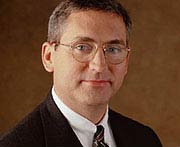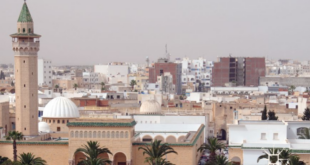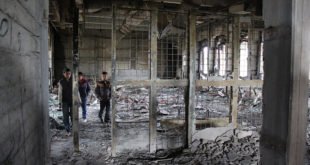Eason Jordan, chief news executive and newsgathering president for the CNN News Group, talked to TBS Managing Editor Sarah Sullivan about covering Afghanistan, the Middle East, and other hot spots; whether US audiences are talking more of an interest in world news in the wake of September 11; and how CNN regionalizes coverage for audiences around the world.
Sarah Sullivan: Our cover story for this issue of TBS is "Media in the Midst of War"—originally intended to focus on September 11 and the war in Afghanistan, but now also focusing on recent events in the West Bank. How do you go about covering a story like the Israeli/Palestinian situation? Both sides have at one point or another complained that CNN is biased against them. How do you aim at achieving balance in covering something that's this sensitive?
Eason Jordan: Well, the Israeli/Palestinian conflict has been enormously challenging for us, in part because one of the biggest issues we face is the safety of our people. We've had a number of CNN journalists shot at in the field and there are hostile forces on all sides, so it's not just a question of facing hostility about the coverage, it's an issue of the journalists themselves facing not just hostility but danger. This has been of great, great concern to us.
Sullivan: What kind of measures can you take to try as much as you can to guarantee the safety of your people in a situation like this?
Jordan: Well, there are no guarantees. We've done everything we can within reason to keep our people alive. We've deployed armored cars, there are flak jackets, there are helmets, we even have some security advisers in the field, former British special forces, with our people just to advise us at all times. Should something terrible happen, these people are trained in first aid and so forth. In fact, we had a team out just the other day with a security adviser with them, in the West Bank, and a French journalist who was not part of the CNN team was shot. Immediately the security adviser who was working with the CNN team came to the aid of that journalist and was able to treat him on the scene and subsequently get him to a hospital. So we've done everything we know to do to keep our people alive in these situations.
Sullivan: Over the last two weeks or so representatives from the BBC, the Committee to Protect Journalists, and other media organizations have been complaining about the treatment journalists have received from Israeli authorities and Israeli forces. A press release issued by the Israeli Government Press Office said that a written warning had been sent to your correspondent Michael Holmes for continuing to broadcast from an area that Israel had declared a closed military area. Are you facing problems concerning access?
Jordan: Access is a big problem. Clearly priority one is keeping our people alive, because if we don't have people to go to these places, access is irrelevant. But we've had spirited discussions with Israelis in the government about these restrictions that have been imposed in these closed military zones. On the whole I think those discussions have gone well; despite the threats to expel CNN journalists from the territories, for instance, we remain there relatively unimpeded. Although it's clearly a very dangerous place to be.
Sullivan: How many people do you have on the ground there right now?
Jordan: About fifty, including correspondents, producers, cameramen, the whole crew. We have a sizable Jerusalem bureau of about twenty people during so-called normal times, and then we've supplemented that significantly.
Sullivan: Something that's often said of CNN is that your real strength and your real audience comes when there's a huge breaking story, such as this or such as September 11, or going back to the Gulf War, that virtually the entire world wants to follow. It may seem a completely moot point considering what we've seen over the last six months, but what drives CNN in times of relative peace? Do you maintain an audience when there isn't a huge breaking story?
Jordan: These stories will be with us for a long time to come. I think it's understandable that people would not watch CNN as much in relatively tranquil periods as they would in more intense periods, in times of crisis. We want, in relatively tranquil times, to provide insightful, thoughtful reporting that helps people understand the issues of our time, and have some character-driven stories that help people understand on a human level some of the more challenging issues that people around the world face. We additionally want to have programming that is relevant and compelling not just during hot periods but when the news is relatively calm.
Sullivan: That's nice segway into my next question, which is how you handle the difference between live reporting and field reports, or package reports. It seems that with breaking news and big stories, and also with technologies such as video phones that you might use in a situation like Afghanistan, there's a tendency to go live to correspondents rather than focus on field reporting, and it seems to me that this has been more and more CNN's focus. But there's a serious argument to be made for field reporting, for the reasons you just mentioned—it gives you a chance to get the background on a story, to provide that kind of thoughtful, insightful background to your viewers.
Jordan: I think during very hot news periods you'll see much more live reporting than during relatively slow news periods. Having said that, there are times even during the hot news periods when we pause, step back, and really take a more thoughtful look at the news, showcasing reporting from the field, interviews, and so on. We have a program on CNN International called Insight, a daily half-hour single-subject program; we have a number of programs where we intentionally step back and have less live reporting and more thoughtful reporting from the field.
Sullivan: On the domestic US CNN network as well?
Jordan: Sure. Just as we have programs on CNN International that are more in-depth perspective type programs, we have those on CNN USA as well, in prime time, where we have for instance Aaron Brown host a program 90 percent of which is made up of correspondent pieces. It very much depends on the time and day. You're more likely on the US service of CNN to see live event coverage during the day than you would during prime time.
Sullivan: One program you air in the US is CNN World Report, which is one of the few chances the American TV viewing public has to see perspectives from broadcasters around the world—there's not much of a chance for US TV audiences otherwise to receive international news from non-US perspectives. How would you characterize the importance of World Report to CNN and its impact on your audience in the US?
Jordan: We think it's important to share a variety of perspectives with our audiences in the United States and around the world. People in different places view the news differently—I think the Middle East conflict is a prime example of that. Also the so-called war on terror—depending on where you are in the world the perspective could be quite different. In the United States we think it's important to present a variety of perspectives and also to present stories that really wouldn't be seen if CNN alone were responsible for unilaterally reporting all the stories we put on CNN.
Sullivan: It was sometimes said before September 11 that US audiences are not necessarily all that interested in foreign news. Do you think that was true, and if so do you think September 11 has changed that?
Jordan: I think it's difficult to make such broad generalizations. Without a doubt the world matters a great deal to the United States and to many, many Americans. In some cases Americans don't realize how important the world is to them; in many ways it's more important today and even before September 11 than it has been in a long time. When you look at international trade, challenging foreign affairs issues, transportation, medical issues, they all transcend borders. I think yes, people in the United States do care about the world, but sometimes journalists and news organizations shortchange the American people by not providing the best possible international news coverage. It can't just be headlines and images that make people's eyes glaze over—photo opportunities of foreign ministers meeting somewhere. We need meaty reporting, reporting that is insightful and enlightening, and stories that are interesting and compelling to people. I travel all over the world, I spend a lot of time in the Middle East and in other places around the world, and I find the world endlessly fascinating. But I can't say that even at CNN as well as through other news media outlets that the world is as interesting on TV and in newspapers as it is to me when I get out and actually see it for myself. I think if we do a better job of reporting, we can help people gain a better understanding of the world and make them care more about the world.
I think the test of a news organization is not whether it responded with big coverage of the world after September 11 but whether it took the world seriously prior to September 11. I would say that CNN is an exception, that we've had people in Afghanistan for many years running prior to September 11; it was no coincidence that we had a team in there on September 11. Yes, many news organizations and many people around the world are paying much more attention to the world today, but there are highs and lows in terms of import of news as times passes. One thing that distinguishes CNN is that we will always take the world seriously.
Sullivan: When you send correspondents and staff out around the world, how important is it that they speak the local language, have some in-depth knowledge of the region they're covering?
Jordan: Every story, every country is different. We want a combination of journalists who are from the region, great journalists who are not necessarily from the region, and great storytellers, people who can report stories in fascinating ways. About eighty percent of our staff outside the United States is either a local national or a third-country national, not American. We have a few Americans out there. It's a great thing to have journalists in the field who speak the language, know the players, know the geography—that's very important, and most of our people fall into that category. Having said that, there are some journalists who, for example, might be based out of London or Hong Kong or New York or Atlanta who provide an interesting perspective themselves being newcomers to a region. For example in the Middle East right now have a number of correspondents; we have an Israeli, we have a Palestinian, we have a number of Europeans, we have a South Africans, and we have one or two Americans as well, and they all bring a different perspective to the table. It's important to have that variety, and even to intentionally send in one or two people who are fresh to the story, because the perspectives you get from a relative outsider versus the perspectives you get from somebody who's been living it for forty years actually can be a very good thing as long as it's not the only perspective being presented.
Sullivan: One criticism often heard here in this region of CNN—and this touches on the point you just made—is that even CNN International is perceived of as being very American, presenting American perspectives. How does CNN see itself or "brand" itself—are you an American network, or do you see yourselves as regionalized or international?
Jordan: We certainly tailor our programming for the marketplace; most of CNN's consumers live outside the United States. A great deal of our programming originates from outside the United States. Many of our journalists come from outside the United States. The reality is that we are a US-based news channel, but that doesn't mean we're American in perspective with our international service. In fact the person who oversees all our international outlets is not an American at all, he's British, and we hired him from the BBC several years ago. There are more than fifty nationalities of journalists who work at CNN International producing that service. If we were to move CNN's base to Egypt maybe they'd say we're Egyptian—you have to be based somewhere. It's the people who produce the channel and the people who provide the reporting who are really responsible for it, and those are people from all over the world, the very best journalists and program makers we can find. No matter what CNN International does, as long as CNN's headquarters is in the United States people are going to say, well, it's an American service. But the reality is that it's an international service based in the United States, and we don't make any apologies about that.
Sullivan: Does the recent launch of CNNArabic.com, your Arabic language website based in the new Dubai bureau, represent a strengthening of CNN's commitment to covering the Middle East? And will the website possibly lead to an Arabic-language channel, to go along with your other non-English channels?
Jordan: It certainly demonstrates CNN's commitment to the region. The website is a young service, it's a growing service. I'm sure it will mature significantly over time. But we take the entire region very, very seriously, we have bureaus in Cairo and Baghdad and Beirut and Jerusalem, and people in other places. Dubai was important for us; it's the first time we've raised a CNN flag in the Gulf, and we think it's the perfect place to be. Dubai Media City, which I've visited, is most impressive. Over time I think you'll see CNN's commitment to the region heighten even further. We've explored a lot of possibilities in terms of news services in other languages, and if we could find a model that made sense financially, operationally, and journalistically then we would enthusiastically move forward with it.
Sullivan: You have affiliates around the world; could you brief us on what is at the heart of the CNN/affiliate relationship, for example, what newsfeeds they receive from you, how you assist them in coverage or how they assist you in coverage.
Jordan: There are really two levels of CNN affiliates; we have the contributors to the World Report program, and some of the contributors to that program are full-fledged CNN affiliates, others are just affiliates of the World Report program, they contribute to that program but don't otherwise have access to other CNN content services. Full-fledged CNN affiliates have access to CNN material off our air, and we also have unbranded, clean newsfeeds of CNN material that goes out via satellite around the world. We can provide facilities and transmission capabilities for places around the world. But having all these affiliates—it's about 200 national and international networks based outside the United States and in local markets in the US there are about 650 of them—they provide us with a tremendous competitive advantage, because we can call on an unrivaled set of resources beyond CNN's unilateral newsgathering resources to provide immediate and broad coverage from all over the world. We have a lot to offer, and certainly they have a lot to offer us.
Sullivan: Can you comment on the status of your relationship with Al-Jazeera?
Jordan: We're waiting to see where the relationship will go. I spent several days in Doha last summer trying to make the relationship one that would be special, and I think it got off to a very good start. Obviously there were some strains after September 11 particularly with regard to the bin Laden interview, but I think we've cleared the air on that, and I hope that we'll be able to work together in a positive and constructive way going forward.
Sullivan: Your coverage in Afghanistan, it's been reported, has been one of the most expensive and resource-intensive operations CNN has ever undertaken. Can you describe who you have there now, what kind of technologies are being used, and how you're even getting equipment in?
Jordan: We have a large team in Afghanistan as well as in Pakistan, and we've bolstered the size of our Islamabad bureau in recent weeks. We probably have 30 to 40 people in those countries combined, and we'll be there for a long time to come. It's been enormously expensive, but again as with the Middle East, the biggest concern we have is just keeping our people alive. We've seen eight journalists killed in Afghanistan and then obviously the Danny Pearl situation was so tragic. Money is inconsequential in relative terms when we're talking about people's lives. We'll be there for the long term with all the people we need to provide the very best coverage possible. The communications are very expensive, the satellite phones and satellite links. The transportation is very expensive, and the security is very expensive—we have more bodyguards on the ground in Afghanistan than we do journalists.
We're working two very, very big stories right now that have a couple of things in common. One is they're enormously costly, but more importantly or more worrying is that they're both exceptionally dangerous, because we've seen something in both places that I thank God happens very rarely, and that is that in both places journalists are not only being killed but they're being targeted. There are combatants in both of these conflicts who are trying to kill journalists, and that is unusual and a very nightmarish situation.
 Arab Media & Society The Arab Media Hub
Arab Media & Society The Arab Media Hub





